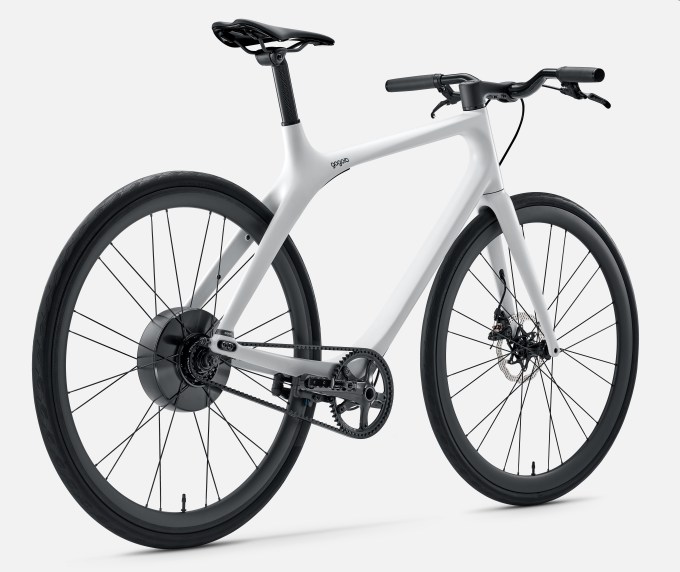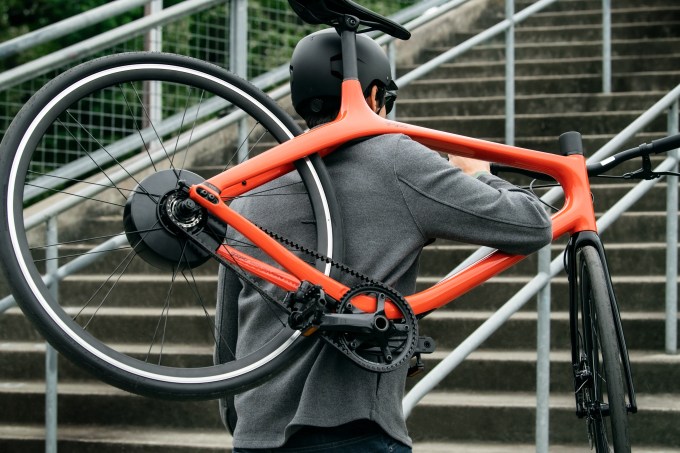Gogoro, the mobility company best known for its SmartScooters, revealed details about its new ebike brand Eeyo today. Eeyo will launch with two lightweight models, both powered by the SmartWheel, a self-contained hub designed by the company that integrates motors, batteries, sensors and smart connectivity technology.
Eeyo is the first product that Gogoro will introduce in the United States, nine years after it was founded by HTC executives. The ebikes will go on sale there and in Taiwan, where Gogoro is based, in July, and in Europe shortly afterward.
With more than 300,000 customers, Gogoro’s SmartScooters and their charging stations are a common sight in Taiwanese cities. Technology developed by the company, including its lightweight rechargeable batteries, are also used in scooters made by Yamaha, Suzuki, Aeon and PGO. It plans to make Eeyo’s tech available to manufacturing partners as well.
Gogoro co-founder and CEO Horace Luke told TechCrunch that even though scooters are widely used in many cities in Asia and Europe, they are less common in the U.S., so the company decided to make Eeyo its first American launch instead of the SmartScooter.
The team began planning Eeyo’s launch a year ago and even though they could not have anticipated it would happen during COVID-19, Luke said the pandemic has created new demand for ebikes, a market that was already growing quickly.
“At the moment, use of public transportation is down and people are very cautious about it. This is forcing people to find alternative ways to get around,” said Luke. “A lot of cities are very hilly, commutes are long and with streets closed, cars are not as efficient as they used to be. So there is a huge demand and the ebike market is blowing up.”
The company began working on Eeyo about three years ago, with the idea of creating a “human-electric hybrid.”
“That sounds like a fancy way of saying ‘e-bike’ until you ride what we made,” Luke said. “It took a lot of time for us to create this project. Instead of focusing on utility and the power assistance to get somewhere, we wanted to create a different paradigm. Thinking ‘I need to take my ebike to the grocery store’ isn’t usually exciting, but we wanted to focus on agility and excitement.”
Eeyo’s first ebike models, the 1 and 1s, were designed with a specific user in mind: city dwellers who want agile, fast bikes that are able to handle tricky terrain like hills. “I kept telling our team, I want the bike to give me the same feeling I had when I was 18 and able to get somewhere without breaking into a sweat. I wanted to bring that excitement and joy back into riding a two-wheeler to our customers.”
The Eeyo 1s and 1 weigh 26.4 pounds and 27.5 pounds, respectively, much lighter than many ebikes, which typically weigh 45 to 50 pounds. Its carbon fiber frame was designed so riders can carry the bikes on their shoulder. They are charged either by snapping chargers around their hubs, or placing them on an optional stand charger.
Most of the technology used in Gogoro’s SmartScooters, including its batteries and charging stations, were designed by the company’s engineers. SmartWheel, the key technology behind Eeyo, was also developed in-house.
“What drives the mechanism for performance is our innovation, the SmartWheel,” said Luke. “It is a hub-based motor, it has a battery and sensors in it, a computer system and a motor system.” That includes Gogoro’s Intelligent Power Assist system, which uses a torque sensor to detect how hard a rider is pedaling and calculate the amount of assistance the bike needs to give.
 The SmartWheel also connects to the Eeyo app, which enables riders to monitor their speed and pedaling power when their smartphones are mounted to the bike. It also downloads over-the-air firmware and software updates for the bike, similar to the Gogoro SmartScooter’s automatic updates.
The SmartWheel also connects to the Eeyo app, which enables riders to monitor their speed and pedaling power when their smartphones are mounted to the bike. It also downloads over-the-air firmware and software updates for the bike, similar to the Gogoro SmartScooter’s automatic updates.
Both Eeyo models use the SmartWheel, have full carbon fiber frames and forks, and two riding modes: “sport mode,” which responds to the rider’s pedaling and delivers about 40 miles of range, or the distance the bike can be used to travel on one charge, and “Eco Mode,” which conserves battery power by limiting power assistance and can extend the ebike’s range to 55 miles.
The Eeyo 1s is available in one color, “warm white,” and its seat post, handlebars and rims are also made out of full carbon fiber. It weighs 26.4 pounds and will be priced at $4,599. The Eeyo 1 comes in two colors, “cloud blue” and “lobster orange,” and uses alloy seat posts, handlebars and rims instead. It weighs 27.5 pounds and will cost $3,899.
Gogoro sees itself as a mobility platform business that not only manufactures vehicles, but also develops technology for electric vehicles and vehicle sharing. Luke said the company wants to offer its ebike technology, including the SmartWheel, for use by other manufacturers because Gogoro “has never taken a one-size-fits-all approach, even with our scooter business. That is one reason we work with Yamaha, Suzuki, PGO, Aeon.”
Working with partners also furthers the company’s goal of getting more electric vehicles on the street and reducing pollution.
“We only have X amount of years to make changes and if we get more people alongside us, we can make a giant impact,” Luke added. “Other people will build different form factors, ones that are more leisure-like, more focused on utility, while we focus on sportiness, agility and fun.”
from Startups – TechCrunch https://ift.tt/36zO3Jo

Comments
Post a Comment